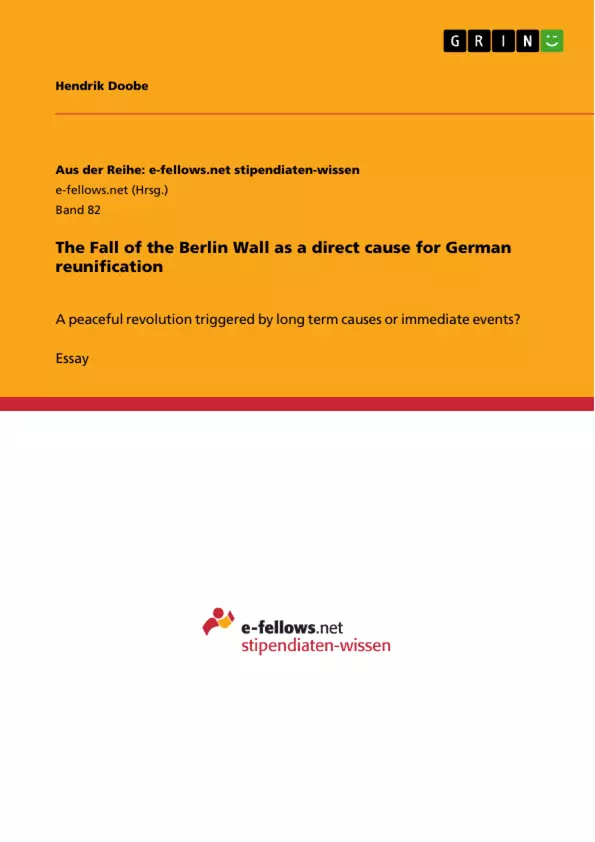This investigation, including the examination of unpublished primary sources, accounts for the Fall of the Berlin Wall as a historical event. The disintegration of the Warsaw Pact along with the interior social, economic and political problems in the GDR are examined as long term causes as well as the influence of the media, the church and the citizens of the GDR themselves as main players in the short term. Additionally, the immediate events in the beginning of November 1989 are scrutinized in connection with the Fall of the Wall. The research question in two parts is whether the events around the 9th of November, 1989, can be labelled ‘peaceful revolution’ and what the causes for that revolution are. What is the historical significance of the event and what was it derived from? Consistent with the primary and secondary sources used, the essay concludes that the Fall of the Wall was indeed a peaceful revolution. Examining the development towards pluralism and democracy by the USSR and her satellite states as the foundation for that revolution, the essay scrutinizes both the work of the media with its fuelling effect and the actions of the church as a ‘replacement public’ as causes for the incident. The state with its restrictive forces impaling every aspect of public life producing social, economic as well as political disadvantages for its citizens is the reason for opposition developing. Encountering this opposition, the party looses control over the people and misses a historical chance. Instead of selling the Fall of the Berlin Wall as a sovereign decision for empowerment of the GDR’s citizens it has to watch how the means of isolating them from foreign influences is dismantled. Therefore the significance of the 9th of November 1989 lying in the irreversible loss of power and control by the SED was initiated by the party itself.
Inhaltsverzeichnis (Table of Contents)
- Abstract
- Introduction
- Disintegration of the Warsaw Pact
- The SED and its model of Socialism
- Chaos, Confusion, Miscommunication: Schabowski's '...sofort, unverzüglich'.
- The media builds bridges.
- The special position of the church and its relevance
- The peaceful revolution
- Conclusion
- Bibliography
Zielsetzung und Themenschwerpunkte (Objectives and Key Themes)
This essay explores the fall of the Berlin Wall as a historical event, analyzing both long-term causes such as the disintegration of the Warsaw Pact and internal social, economic, and political issues within the GDR, and short-term factors like the influence of the media, the church, and the actions of East German citizens themselves. The primary research question is whether the events of November 9, 1989, constitute a "peaceful revolution" and what the causes for this revolution were. The essay examines the historical significance of this event and its underlying causes.
- The role of the Warsaw Pact's disintegration in the fall of the Berlin Wall.
- Internal challenges faced by the GDR, including social, economic, and political issues.
- The influence of the media and the church in the events leading to the fall of the wall.
- The role of East German citizens in driving the "peaceful revolution."
- The immediate events of November 9, 1989, and their impact on the fall of the Berlin Wall.
Zusammenfassung der Kapitel (Chapter Summaries)
The introduction explores the immediate events surrounding the fall of the Berlin Wall on November 9, 1989, emphasizing the unexpected nature of the event and the role of the East German citizens in driving it. The essay raises the question of whether this event can be labelled as a "peaceful revolution" and examines its underlying causes. The chapter discusses the long-term factors contributing to the fall of the wall, including the disintegration of the Warsaw Pact and the internal problems within the GDR. This section also delves into the role of the media and the church in the events, along with the actions of East German citizens. The chapter concludes by considering the significance of the fall of the wall and its lasting impact on German history.
Schlüsselwörter (Keywords)
The core themes and concepts explored in this essay include the fall of the Berlin Wall, peaceful revolution, German reunification, the disintegration of the Warsaw Pact, the GDR's internal social, economic, and political issues, the role of the media and the church, and the actions of East German citizens. These keywords encapsulate the primary areas of investigation within the essay, providing insight into the historical context, key players, and underlying forces that contributed to this pivotal event.
Frequently Asked Questions
Was the fall of the Berlin Wall a "peaceful revolution"?
Yes, the investigation concludes that the events leading to November 9, 1989, can be characterized as a peaceful revolution driven by the citizens of the GDR.
What were the long-term causes of the fall?
Key long-term causes included the disintegration of the Warsaw Pact and severe internal social, economic, and political problems within the GDR.
What role did the church play in East Germany?
The church acted as a 'replacement public' (Ersatzöffentlichkeit), providing a safe space for opposition and organizing peaceful protests.
How did the media influence the events of 1989?
The media had a fueling effect, building bridges between the East and West and broadcasting the unfolding events, which encouraged further protests.
What was the significance of Schabowski's announcement?
His mistaken announcement that travel restrictions were lifted "immediately" (sofort, unverzüglich) caused chaos and led thousands to the border crossings, making the fall of the wall irreversible.
- Quote paper
- Hendrik Doobe (Author), 2002, The Fall of the Berlin Wall as a direct cause for German reunification, Munich, GRIN Verlag, https://www.grin.com/document/174706



